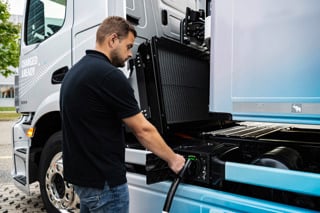The policies of some fleets are being called into question after research revealed a majority of drivers avoid having to pay fines and charges.
More than half of drivers surveyed said parking fines were not passed on, while four out of every five escaped end-of-contract charges or forking out for accident damage.
It means cash-strapped companies up and down the country are footing the bill because they are failing to hold company car and van drivers to account.
Tracey Scarr, fleet and road safety manager at Arval, which was named Safe Fleet of the Year at the Fleet News Awards, was surprised by the survey’s findings.
She said: “Surely the company can’t be held responsible for where a driver decides to park? He or she makes that decision.
“It’s simple, if a driver gets a parking fine, they pay. Why would the company choose to pick up the cost of a parking fine? It doesn’t make financial sense.”
The survey of more than 200 at-work drivers from across the country was commissioned by ALD Automotive and revealed that 48.9% had paid or would expect to pay a parking fine, while 51.1% don’t have to pay a penny.
Frances Warburton, account development manager at ALD Automotive, said: “It’s very common among our customer base to pass on the parking fine to the driver and charge them an administration fee.
“Ultimately, it’s their responsibility, so they should be expected to pay.”
However, charging drivers for damage to a company vehicle can be a thornier issue for fleets to grasp.
There is a need to have a clear, concise policy in place, which is well communicated to all at-work drivers and leaves their responsibilities in no doubt.
Scarr, who operates a fleet of more than 300 cars, said her drivers were charged an excess if they had more than one at-fault accident in a rolling 12-month period.
She explained: “Our goal has never been around trying to recover any money. It’s about ensuring lessons are learned and discussing the incident with the driver.
“It’s important to understand what’s happened, how it could have been prevented and ultimately where did the fault lay – we talk to everybody about every incident.”
The survey showed that just 16.7% of drivers had paid or would expect to pay for damage to their vehicle – a staggering 83.3% said they did not pick up any costs.
Warbuton said: “We are quite often asked how other businesses deal with this issue; they want to follow what others do and look to us for guidance.
“Interestingly, it’s important to individual employers to know that they are not too draconian or lenient compared to other businesses within their sector.”
She continued: “It’s also quite common for customers to stagger their recharge costs for accidents and, while some will apply to all accidents, some only choose to charge for at-fault accidents.”
But Warburton warned fleets to be aware of the potential “massive” increase in non-fault accidents if an at-fault-only recharge policy was introduced.
The temptation proves too great for some drivers to take responsibility for minor prangs and the number of bumps or dents happening to vehicles that have been left in car parks start to increase.
One method used by some fleets to overcome this problem is for the driver to be charged an excess if the company can’t claim from a third party.
Ian Green, group and fleet manager at Peverel, said at a recent Fleet News roundtable that since it had introduced the policy “hit while parked had gone right down”.
Fleets face further costs when defleeting and the fair wear and tear of leased vehicles, together with potential excess mileage charges, are taken into account.
The survey revealed that 15.4% of drivers had paid or would expect to pay end-of-contract charges, while 84.6% would not.
“It can be difficult for some fleets to enforce,” admitted Warburton, “especially if drivers swap cars and, while many do enforce charges for lost keys, most will still take the hit.
“But whatever way a fleet chooses to pass on any of these costs, whether parking fines, end-of-contract charges or damage to a vehicle, the clear communication of a robust set of policies is vitally important.”

























Patriot - 30/04/2012 12:50
90% of Fleet Managers are too ignorant and/or stupid to understand the difference between a legitimate fine or penalty-issued by the Police or a LA- and the unenforceable invoices sent by scammer private parking companies. Furthermore how many Managers appeal tickets issued by CEO's (Traffic Wardens in old money)? The number of incorrectly issued parking tickets is growing, caused mainly by the 'Target' culture endemic in large towns and cities. If Fleet Managers have a 'pay on demand' attitude towards any and all parking tickets then they deserve to be out of pocket. They are also probably aware of the penalties for deducting money from an employee on spurious grounds. I hope.